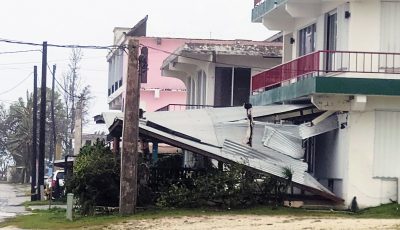‘Courts may order govt to pay land compensation’
On Dec. 28, 2016, the Supreme Court issued a ruling in Commonwealth v. Lot No. 218-5 R/W, 2016 MP 17, holding that the trial court did not violate the separation of powers doctrine in ordering the Commonwealth to pay a land compensation judgment out of funds that are not appropriated for that purpose. The high court, however, vacated the court’s writ of execution ordering the payment and remanded the matter on other grounds.
The appeal arose from the Commonwealth’s taking of Luisa B. Quitugua’s land in As Teo, Saipan for public use in 1996, over 20 years ago. In 2005, the trial court entered a judgment directing the Commonwealth to pay Quitugua approximately $77,000 plus interest as land compensation. When the Commonwealth repeatedly failed to pay, the trial court issued a writ of execution seizing all monies and proceeds in the Commonwealth’s bank accounts up to the “amount necessary to satisfy the judgment.” The court also issued a related order applying a 9 percent post-judgment interest rate.
On appeal, the Commonwealth argued the court violated the separation of powers doctrine by compelling the government to pay from funds that are not appropriated for land compensation. In addition, the Commonwealth contended the court violated sovereign immunity in applying the statutory 9 percent post-judgment interest rate.
In discussing the separation of powers issue, the Supreme Court first summarized the existing law. The takings clauses of the Commonwealth and federal constitutions provide that private property may not be taken without just compensation. Under the separation of powers doctrine and the appropriations clause of the CNMI Constitution, the Legislature has the sole power to make appropriations. The high court referred to its prior decision, which held that the Commonwealth courts may not order the government to pay land compensation judgments out of funds that are not appropriated for settlements and awards. In light of both policy and legal reasons, however, the high court revisited the decision in Lot No. 353 New G.
As for policy concerns, the high court noted the government’s repeated failure to pay land compensation. While the right to just compensation is a well-settled, natural right, many landowners have been waiting for compensation to no avail. In this case, over 20 years have passed since the taking of Quitugua’s land, and the government has still not satisfied its obligation. As for legal considerations, other jurisdictions have held that a lack of legislatively appropriated funds does not justify non-payment of land compensations. The high court applied applicable principles to harmonize the takings clause and appropriations clause and found that the appropriations clause should not be interpreted as inhibiting the takings clause in the Commonwealth Constitution.
In conclusion, the Supreme Court held that when the government takes private property for public use and fails to compensate the landowners, the Commonwealth courts have the authority to order the government to pay land compensation judgments even in the absence of legislatively appropriated funds. The high court decided that this ruling must apply retroactively to all civil cases that have not reached final judgment, including those pending on remand to the trial court. The high court, however, found the writ of execution was an improper method to enforce judgments against the Commonwealth. Accordingly, the Supreme Court vacated the writ of execution and remanded with instructions to use a proper method to enforce the judgment owed to Quitugua.
As for the interest rate issue, the Supreme Court found the trial court erred in applying a statutory 9 percent post-judgment interest rate because the statutory rate does not apply to the government absent explicit consent of the government. On remand, the trial court is instructed to determine the proper post-judgment interest rate.
The Supreme Court’s full opinion is available at http://www.cnmilaw.org/supreme16.html.
For further information, contact the Supreme Court at 236-9715. (NMI Judiciary)



























